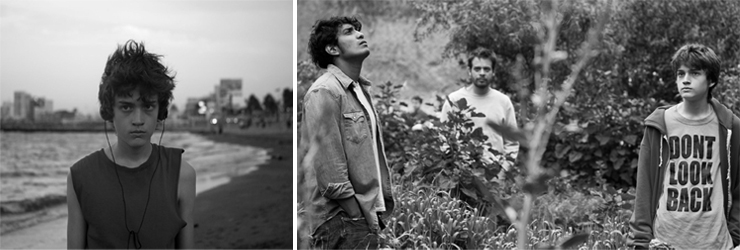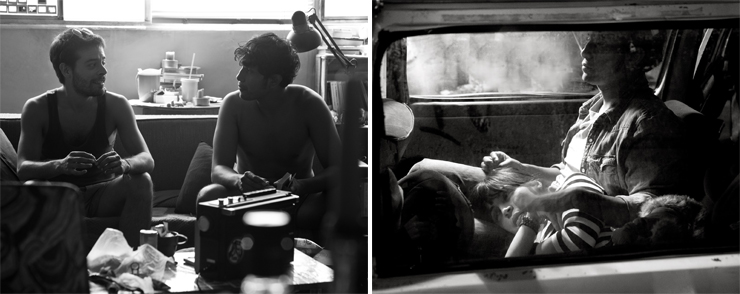
LEFT: Sebastián Aguirre, RIGHT(from left): Tenoch Huerta, Leonardo Ortizgris, Sebastián Aguirre).
We know Tomás, the snot-nosed punk that sets the award-winning Mexican import Güeros in motion, is trouble 'cause he likes dropping water balloons on unsuspecting people. The Veracruz-based slacker gets himself in a pickle after the liquid missile aimed at a young mother lands squarely on her baby's head instead. It's a fitting metaphor for a deadpan comedy that misses the mark more often than not.
Mom's just about had it with the sullen güero (pejorative slang for a blond and/or light-eyed person), so she sends Tomás (Sebastián Aguirre) off to Mexico City to stay with his older brother Federico (Tenoch Huerta). The year is 1999, and the metropolis has been paralyzed by student protests at the Universidad Autonóma Nacional de Mexico (UNAM). The aimless lad arrives to find a run-down flat with no power and a sibling who sits around the place all day with and his roommate Santos (cutie patootie Leonardo Ortizgris, who looks like Jorge Sanz and Rory Cochrane's love child), doing nothing. Among his big city friends, Fede's known as Sombra (Shadow), and because of his darker skin, people are taken aback when they're told he's related to Tomás.

LEFT (from left): Leonardo Ortizgris, Tenoch Huerta, RIGHT (from left): Ilse Salas, Tenoch Huerta.
When Tomás asks Sombra why he hasn't joined the protesters, he replies, “We're on strike from the strike.” No love lost, then, between the bickering brothers, who snipe at each other whenever Sombra's not sweet-talking Aurora (Camila Lora), the girl with Down syndrome who lives downstairs from him, into letting him borrow their electricity. And so it goes, for what feels like an eternity, rendered in boxy black-and-white that purports to emulate French New Wave self-referentiality but is actually, for the most part, messy handheld camerawork brimming with labored look-at-me braggadocio. (Kudos to Kino Lorber, the film's U.S. distributor, for cutting a trailer that makes the film a lot more polished and inviting.)
A newspaper headline jolts Tomás out of his stupor. Legendary Mexican rocker Epigmenio Cruz has reportedly been hospitalized with cirrhosis of the liver, and is not expected to live for much longer. (“Once, he made Bob Dylan cry,” says Sombra.)
The quest to meet the music icon gives Güeros a semblance of a narrative, but by that point, this reviewer had overdosed in self-satisfied navel-gazing. If you have the patience to make it to the halfway mark in this nearly two-hour road movie, writer/co-screenwriter Alonso Ruizpalacios does pull off impressive work inside the UNAM, where student protesters have set up shop inside the classrooms and are planning a protest of two local TV stations. Ruizpalacios, here making his feature debut, captures the unrest with you-are-there immediacy, and he also nails the rifts that prevent this student movement from becoming more unified. They have a strong leader in Ana (Ilse Salas), who struggles to keep her peers united even when they objectify her and call her a “classist whore.” The sequence is most definitely a highlight in this overly indulgent blob of a coming-of-age yarn, but storywise it amounts to little more than an extended stop in the characters' road trip.
Ruizpalacios excels at revealing heretofore unforeseen traits in his characters – yes, there is a connection between Ana and one of the main characters – doling out tidbits of information in organic fashion, but in attempting to give his film a free-flowing structure, he just makes it feel shapeless and overlong.
All the elements are in place for a compelling family dramedy, including a uniformly strong cast, but Ruizpalacios is too busy indulging in stylistic flourishes for us to form much of an emotional bond with the characters, leading to a closing shot that would have been really powerful if he'd tightened the film's structure and reined in his self-indulgent impulses. Style comes before substance way too often, and the effect is obtrusive. For example, when Santos, Sombra and Tomás are attempting to get away from Aurora's irate dad, Sombra suddenly finds himself surrounded by feathers inside his car. Why? To capture his frazzled state of mind, of course. But the execution is so precious is fails to take the viewer inside the character's ennui.

LEFT: Ilse Salas, RIGHT (from left): Leonardo Ortizgris, Tenoch Huerta, Sebastián Aguirre.
Ruizpalacios thinks he's making a Mexican 400 Blows with echoes of early Jim Jarmusch, but strip away the bells and whistles on the surface and we're left with a south-of-the-border Amerindie – think Little Miss Sunshine with a dash of Stranger than Paradise – complete with a climactic monologue that spells out every preceding story beat. You know, for those viewers who had dozed off during the first hour. Güeros, which picked up Best First Feature honors at the 2014 Berlin Film Festival, captures what it felt like to be an adolescent in a pre-Internet, pre-iPod world. The streets of Mexico City also feature prominently, occasionally resembling Detroit's desolation. But these are all bright glimmers in a movie that all too frequently crosses the line from confidence to conceit on the road to familial reconciliation.
Güeros is now showing at the Coral Gables Art Cinema through July 2. For showtimes and tickets, go to gablescinema.com.




